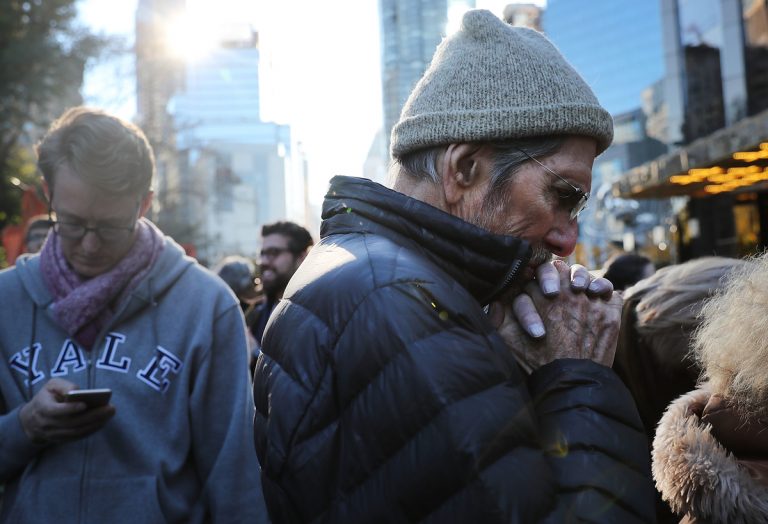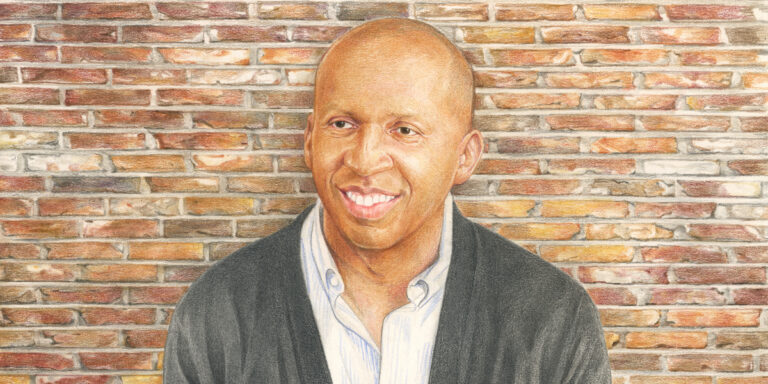
Image by Spencer Platt.
We Need Hope That’s Gritty and Grounded
I still have hope.
Yes, hope that we will always remember that there is love and beauty and tenderness in this world. Hope that we live through the faith that the beauty here is a reflection of divine beauty. Hope that tenderness and kindness will outlast meanness and hatred. Hope that we as a human community will put love above indifference. Hope that justice for all will overcome a “just us” mentality.
But that hope does not mean that I hope corrupt, racist politicians will show themselves to be anything other than, and less than, corrupt and racist. Hope does not mean being politically naïve or gullible.
Hope does not mean abandoning one’s own mission and seeking redemption in any one man (or woman’s) messianic project.
In the first week of living through this new phase of American history, it is amply clear to me that not everyone is experiencing the Trump trauma in equal ways. I dare say that for Hispanics, Muslims, refugees, African Americans, gays/lesbians, and those concerned about women’s reproductive rights, the trauma is acutely personal and immediate.
This is no time for naïve wishful thinking. Let us remain eyes wide open, stay woke, organize, mobilize.
The first signs of the Trump presidency are indeed deeply concerning. Donald Trump is reported to have named Frank Gaffney to his transition team. Yes, the same Gaffney whom the Southern Poverty Law Center has named “one of America’s most notorious Islamophobes.” The same Gaffney who has for years championed the notion that President Obama is a closet Muslim, and that there is a secret Muslim plot to take over America.
Trump has named James Woolsey, one of the neo-conservative architects of the disastrous Iraq war, to his team.
Another appointee seeks to expedite the “wall” between the U.S. and Mexico without congressional approval.
And perhaps most disastrously, he has appointed Stephen Bannon, the editor of Breitbart, one of the key figures in mainstreaming white nationalist racism, as one of the highest positions in his transition team. This appointment was immediately praised by the KKK and the American Nazi Party. (As I write these words, there is a KKK “victory rally” being planned about 45 minutes from my home.)
Yes, it is as bad as you feel, and worse than we feared.
And I still want to pray for hope. Hope not as something wishy-washy and weak, but as a quality of clutching onto God and reaching out for one another in the midst of pain.
Hope means that I have faith that people of good will can and will reach out to one another, hold hands, rise up, and protect those among us who find ourselves vulnerable.
I still have hope that if the people of good will put their shoulders into it, we can bend the arc of the moral universe towards justice.
It is an amazing realization: the more precious the quality, the more likely we are to cheapen and abase it. We water down love from a mighty unleashing of God to an emoji. We do the same with hope. We have to recover a gritty, grounded type of hope in this age of trauma.
This is one of the lessons that we learned from Brother Martin. Time is morally neutral. Things neither get better by themselves, nor do they get worse by themselves. Life gets better when we reach out to one another, and refuse to be compassionate by proxy. Life gets better for all of us when we recognize that I cannot be who I ought to be until and unless we — all of us — be everything that we ought to be and become.
It reminds me of the whole discussion around wearing safety pins to show one’s solidarity with marginalized groups like Muslims, refugees, Hispanics, and African Americans. Even Captain Jean-Luc Picard (or at least Patrick Stewart) is wearing one. Symbols matter. Interrupting the public space with a declaration of solidarity matters. And we have to make sure that the solidarity through symbols does not remain in the realm of merely symbolic. That symbol has to reflect a commitment to action. If there is an action to speak truth to one’s own community, and to stand up for those who find themselves weak and vulnerable, then the projection of that symbolism in the form of wearing a safety pin is lovely, lovely.
There is a subtlety here that we would do well to bear in mind. The only thing that changes the world is a coming together of individual acts of kindness and justice. And yet, let us remember systems and structures. Yes, systems and structures and institutions matter in the discussion of racism, sexism, homophobia, and Islamophobia (among others). The actions are always at the level of the individuals, but let us keep a vigilant eye on systems and structures.
Yet let us never underestimate the power of one individual,
one act,
one glance,
one touch,
one word,
one kindness.
Ultimately, that will lead us to One Love.
Like so many of On Being’s readers, I am thinking a lot these days of Uncle Vincent, the late and great Vincent Harding. Close friend of Dr. King’s, and the author of the primary draft of the historic “Beyond Vietnam” speech that Brother Martin delivered in Riverside Church on April 4, 1967. One of the times that I was sitting with Uncle Vincent, he shared with me something that seems all the more relevant now. I was asking him what moral lessons he thought the Freedom Movement (his preferred term for the Civil Rights Movement) had to offer us today. He said that he always felt that the task was to create a multiracial, multiethnic, multireligious democracy.
More specifically, he felt that those involved the heart of the movement had a double responsibility: the first was to speak truth to power, to make their suffering visible with dignity. And second was to offer a redemptive vision of hope grounded in open-eyed reality.
This seems to be all the more essential in the terrifying beginning of the Trump era. We have to cling to hope. Though the night be dark, we have to seek out stars. Hope here means not that cheap and debased quality of “optimism” (“It’ll be OK,” “It’ll get better”), but a prophetic, redemptive quality of being prisoners of hope, and to not despair of God’s mercy.
Yes, we have to speak the truth as we best experience it, as people out on the margins and periphery of society experience it. We have to speak the truth though our voice shakes and quakes. And just as importantly, we cannot allow ourselves to give in to despair. We are not a people of hopelessness. Ultimately we have to make it clear that it is right and just and beautiful not only for Muslims and Hispanics and African Americans, but for all of us.
Some of the best and most articulate political analyses of the Trump trauma get the political critique right, but do not tap into that prophetic quality of hope. It’s not the task of everyone to be a prophet of hope, but some of us have to be. Ultimately, we are in it for redemption. Redemption of individual lives, families, communities, and humanity.
Critique without the possibility of redemption gets us further and deeper into the abyss of despair. And we can afford no more starless nights.
As Martin and Vincent and Ella Baker and others used to teach us, we have to save the soul of America.
Yes, America is and has always been a dream wrapped around a nightmare, but there is still something noble about this flawed experiment. And we have to love this experiment enough to dream of a better America, and a better humanity.
I still have hope that if enough of us reach out together, and march forward, that light will have victory over darkness, love over hatred, and unity over division.
Eyes wide open.
Woke in America
in the prison of Trump trauma
But hope for a more perfect union…

